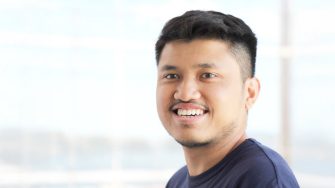Ko Ko Aung
LLB/BE (Hons) 2018
LLB/BE (Hons) 2018

Ko Ko Aung’s journey is one of resilience, purpose, and unwavering commitment to justice.
As a migrant from Myanmar, Ko Ko was acutely aware of the systemic barriers faced by those navigating complex immigration systems, particularly refugees and stateless individuals. This awareness, combined with the ongoing political crisis in Myanmar, inspired him to specialise in immigration and refugee law.
Ko Ko has won the Lawyers Weekly 30 Under 30 three times: for Migration Law in 2025 and 2023; and for Pro Bono/Community Lawyer in 2025. He was the Refugee Council of Australia and STARTTS 2024 NSW Humanitarian Award (Government and Legal) recipient. Ko Ko was also the Law Council of Australia's 2023 John Gibson AM Young Australian Migration Lawyer of the Year.
I am a Special Counsel at an immigration law firm where I advise on complex visa matters, humanitarian and protection claims, deportation, and citizenship issues. The 2021 military coup in Myanmar reinforced my resolve to support forcibly displaced communities and I continue to assist Burmese refugees and provide legal advice to the Australian branch of the National Unity Government of Myanmar.
As the Company Secretary for Afghan Women on the Move, I support a grassroots organisation focused on the rights, leadership, and resettlement of Afghan women and their families. I’ve contributed to creating skilled migration pathways with Talent Beyond Boundaries, helping to shift the global narrative to view refugees as potential, rather than a burden, and supported the Refugee Student Settlement Pathway, an initiative dedicated to enabling young people from refugee backgrounds to access higher education opportunities in Australia.
At the heart of my career is the belief that the law must serve people with fairness, dignity, and compassion. In legal practice or community engagement, I strive to challenge exclusionary systems and contribute to a more just and inclusive Australia.
Outside of work, I’m a passionate follower of the Premier League and a regular at the Barry’s Bootcamp classes at Martin Place. They keep me grounded, focused, and energised.
UNSW not only gave me the academic foundation I needed to pursue a legal career, but it was where I made real connections and found my community.
I was actively involved with the UNSW Law Society, the UNSW Myanmar Student Society, and the UNSW Buddhist Society. Volunteering with these groups gave me a strong sense of belonging and purpose. I met people from all walks of life, many of whom are still close friends and colleagues today. They taught me the value of collaboration, community, and staying connected to my roots while building something new.
Formative internships at Baker & McKenzie, the HIV/AIDS Legal Centre, and the Andrew & Renata Kaldor Centre for International Refugee Law, laid the foundation of my legal career, and grounded my practice in a rights-based, policy-aware approach.
After graduating from UNSW with degrees in Civil Engineering and Law, I embarked on a legal career deeply shaped by my personal journey and a strong commitment to social justice. In 2019, I was admitted as a Solicitor.
Looking back, UNSW was where everything started to come together. It gave me the skills, support, and confidence to step into the work I do now.
Not at all. When I started at UNSW, I had never done any legal studies. In Myanmar the education system was based almost entirely on rote learning and legal studies were not offered. When I arrived in Australia I was stepping into a completely different world, trying to understand not just a new subject, but a whole new way of thinking. Without any seniors from a Myanmar background in the field of law, it was tough navigating that space without a clear roadmap. I remember feeling overwhelmed, unsure if I could ever catch up—let alone thrive.
But over time, things started to shift. I found meaning in the cases I was reading, purpose in the stories of the people I was learning to advocate for, and excitement in the complexity of the law. It became less about just keeping up and more about falling in love with what I was doing. Looking back now, I realise it was all about finding my passion and letting that passion carry me forward.
Don’t worry if your path doesn’t look like everyone else’s. Stay open. Stay curious. Stay connected to what genuinely matters to you. I didn’t have a clear path or anyone from a similar background in law to look to for guidance. There were moments when I felt lost or unsure if I was doing the right thing. But over time, I learned that there isn’t just one “right” way to build a legal career.
If an area of law speaks to you don’t be afraid to pursue it. For me, that was immigration and refugee law. I care deeply about the people I work with and the impact I can have. I’ve found myself slowly falling in love with the work and, especially on the harder days, that makes a big difference.
Lean into your communities. University friends, cultural groups, or volunteering/work colleagues. Some of the best advice and encouragement I’ve received came from informal chats, not official mentoring programs.
Be okay with starting small. Pro bono work, internships and admin tasks all build your experience and teach you valuable lessons. Approach opportunities with humility and willingness to learn. You don’t need to have it all figured out right away.
May 2025